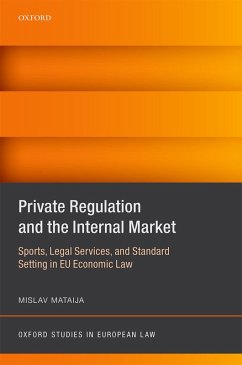How does EU internal market law, in particular the rules on free movement and competition, apply to private regulation? What issues arise if a bar association were to regulate advertising; when a voluntary product standard impedes trade; or when a sporting body restricts the cross-border transfer of a football player? Covering the EU's free movement and competition rules from a general and sector-specific angle, focusing specifically on the legal profession, standard-setting, and sports, this book is the first systematic study of EU economic law in areas where private regulation is both important and legally controversial. Mislav Mataija discusses how the interpretation of both free movement and competition rule adapts to the rise of private regulation, and examines the diminishing relevance of the public/private distinction. As private regulators take on increasingly important tasks, the legal scrutiny over their measures becomes broader and moves towards what Mataija describes as 'regulatory autonomy.' This approach broadly disciplines, but also recognizes the legitimacy of private regulators; granting them an explicit margin of discretion and focusing on governance and process considerations rather than on their impact on trade and competition. The book also demonstrates how the application of EU internal market law fits in the context of strategic attempts by the EU institutions to negotiate substantive reforms in areas where private regulation is pervasive. Surveying recent case law of the Court of Justice of the European Union and the practice of the European Commission, Mataija demonstrates how EU internal market law is used as a control mechanism over private regulators.
Dieser Download kann aus rechtlichen Gründen nur mit Rechnungsadresse in A, B, BG, CY, CZ, D, DK, EW, E, FIN, F, GR, HR, H, IRL, I, LT, L, LR, M, NL, PL, P, R, S, SLO, SK ausgeliefert werden.


